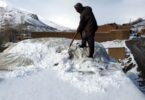KABUL (TOLO News): Chief Executive Abdullah Abdullah on Thursday presided over the meeting of working groups of the newly established Reconciliation Leadership Council at the Sapidar Palace where views were exchanged on some fundamental issues pertaining the authority of the council including the finalization of the government’s peace negotiating delegation with the Taliban, the Qatar delegation and the inclusion of some other delegates in the structure of the council.
The working groups of the council are preparing to finalize council’s priorities and will report back on their work on Saturday.
“Today’s discussion was carried out around the appointment of the peace negotiating team with the Taliban and the delegation which will attend Qatar meeting as well as the inclusion of some other influential personalities in the structure of the council,” said Faraidoon Khozoon, deputy spokesman to Abdullah.
In its second meeting, the council’s members unanimously agreed on the inclusion of some more personalities in its structure is that the council can tackle issues around peace process from a unified and strong position.
Meanwhile, second deputy chief executive Mohammad Mohaqiq said the structure of the reconciliation leadership council was not complete and that there is a need for more influential politicians to be included in its format.
“We cannot say that the council is completed because there are many personalities absent from this council and we need to include them, otherwise, the reconciliation will not be completed,” said Mohaqiq who is also a member.
Twelve out of 18 presidential candidates have also raised their opposition on the structure of the council.
“The reconciliation leadership council proves effective when there is representations from all layers of the society and the political forces,” said Shahab Hakimi, a presidential candidate.
“The reconciliation leadership council should have two portions, one, the decision making part and second, the advisory section to give suggestions. The advisory section can be consisting of 50 people, but the decision making section should be limited,” said Humayun Jarir, member of Hizb-e-Islami leadership council.
The council with an initial 37 members, including Chief Executive Abdullah Abdullah, former President Hamid Karzai, former Jihadi leader Abdul Rab Rasul Sayyaf and other prominent Afghan politicians, held its first meeting on Saturday, April 6. Their second meeting was held on Wednesday to follow-up the decisions made in their first meeting.
But, the meeting between Afghan politicians and the Taliban which was initially scheduled for April 14 was postponed to April 19 as per the decision of the newly-established Reconciliation Leadership Council – which is chaired by President Ashraf Ghani, the Presidential Palace confirmed in a statement on Wednesday.
Next week’s Qatar meeting which will bring Afghan politicians together also provides the first platform for peace in the country where representatives from the Afghan government and the Taliban will present their views on the ongoing and the political settlement in the country under a single roof.
While Taliban insists that no one will attend the Qatar meeting as a representative of the Afghan government, but officials from the National Unity Government on Monday said that a delegation will represent the Islamic Republic of Afghanistan at the meeting which is scheduled for April 14.






